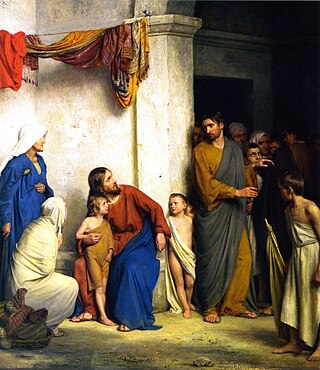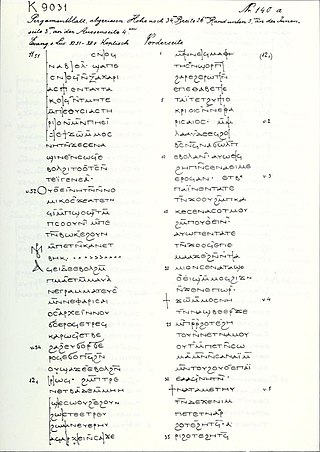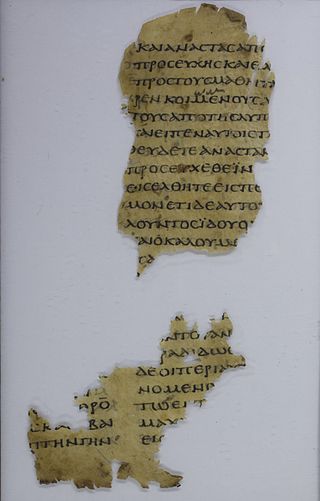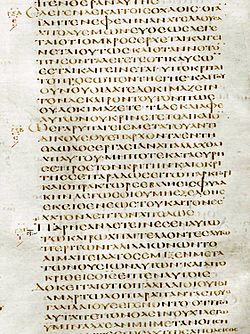
Matthew 13 is the thirteenth chapter in the Gospel of Matthew in the New Testament section of the Christian Bible. Verses 3 to 52 of this chapter form the third of the five Discourses of Matthew, called the Parabolic Discourse, based on the parables of the Kingdom. At the end of the chapter, Jesus is rejected by the people of his hometown, Nazareth.

Luke 10 is the tenth chapter of the Gospel of Luke in the New Testament of the Christian Bible. It records the sending of seventy disciples by Jesus, the famous parable about the Good Samaritan, and his visit to the house of Mary and Martha. This Gospel's author, who also wrote the Acts of the Apostles, is not named but is uniformly identified by early Christian tradition as Luke the Evangelist.
Matthew 16 is the sixteenth chapter in the Gospel of Matthew in the New Testament section of the Christian Bible. Jesus begins a journey to Jerusalem from the vicinity of Caesarea Philippi, near the southwestern base of Mount Hermon. Verse 24 speaks of his disciples "following him".

Chapter 18 of the Gospel of Matthew contains the fourth of the five Discourses of Matthew, also called the Discourse on the Church or the ecclesiastical discourse. It compares "the greatest in the Kingdom of Heaven" to a child, and also includes the parables of the lost sheep and the unforgiving servant, the second of which also refers to the Kingdom of Heaven. The general theme of the discourse is the anticipation of a future community of followers, and the role of his apostles in leading it.

Matthew 19 is the nineteenth chapter in the Gospel of Matthew in the New Testament section of the Christian Bible. The book containing this chapter is anonymous, but early Christian tradition uniformly affirmed that Matthew composed this Gospel. Jesus commences his final journey to Jerusalem in this chapter, ministering through Perea. It can be seen as the starting point for the passion narrative.

Matthew 20 is the twentieth chapter in the Gospel of Matthew in the New Testament of the Christian Bible. Jesus continues his final journey through Perea and Jericho, heading towards Jerusalem, which he enters in the following chapter.

Matthew 21 is the twenty-first chapter in the Gospel of Matthew in the New Testament section of the Christian Bible. Jesus triumphally or majestically arrives in Jerusalem and commences his final ministry before his Passion.
John 16 is the sixteenth chapter of the Gospel of John in the New Testament of the Christian Bible. It records Jesus' continued farewell discourse to his disciples, set on the last night before his crucifixion. In this chapter, Jesus speaks about the work of the Holy Spirit, the joy of the believers and his victory over the world. The book containing this chapter is anonymous, but early Christian tradition uniformly affirmed that John composed this Gospel.

John 18 is the eighteenth chapter of the Gospel of John in the New Testament of the Christian Bible. This chapter records the events on the day of the Crucifixion of Jesus, starting with the arrest of Jesus the evening before. The three denials of Peter are interwoven into the narrative concerning the trials of Jesus.

Luke 6 is the sixth chapter of the Gospel of Luke in the New Testament of the Christian Bible, traditionally attributed to Luke the Evangelist, a companion of Paul the Apostle on his missionary journeys. Jesus' teaching about the Sabbath enrages the religious authorities and deepens their conflict. The selection of twelve apostles is recounted and this is followed by the "Sermon on the Plain", where key aspects of Jesus' teaching are presented.

Luke 9 is the ninth chapter of the Gospel of Luke in the New Testament of the Christian Bible. It records the sending of the twelve disciples, several great miracles performed by Jesus, the story of his transfiguration, Peter's confession and the final departure from Galilee towards Jerusalem. Scottish minister William Robertson Nicoll describes this chapter as unfolding "sundry particulars which together form the closing scenes of the Galilean ministry". The book containing this chapter is anonymous, but early Christian tradition uniformly affirmed that Luke the Evangelist composed this Gospel as well as the Acts of the Apostles.

Luke 11 is the eleventh chapter of the Gospel of Luke in the New Testament of the Christian Bible. It records Luke's version of the Lord's Prayer and several parables and teachings told by Jesus Christ. The book containing this chapter is anonymous, but early Christian tradition uniformly affirmed that Luke the Evangelist composed this Gospel as well as the Acts of the Apostles.

Luke 13 is the thirteenth chapter of the Gospel of Luke in the New Testament of the Christian Bible. It records several parables and teachings told by Jesus Christ and his lamentation over the city of Jerusalem. Jesus resumes the journey to Jerusalem which he had embarked upon in Luke 9:51. This chapter, taken with Luke 12:54-59, begins to outline and illustrate "the problem with the Jewish nation" which accounts for the urgency of his journey to Jerusalem. The book containing this chapter is anonymous, however early Christian tradition generally accepts that Luke the Evangelist composed this Gospel as well as the Acts of the Apostles.

Luke 14 is the fourteenth chapter of the Gospel of Luke in the New Testament of the Christian Bible. It records one miracle performed by Jesus Christ on a Sabbath day, followed by his teachings and parables, where he "inculcates humility ... and points out whom we should invite to our feasts, if we expect spiritual remuneration". The book containing this chapter is anonymous, but early Christian tradition uniformly affirmed that Luke the Evangelist composed this Gospel as well as the Acts of the Apostles.

Luke 15 is the fifteenth chapter of the Gospel of Luke in the New Testament of the Christian Bible. The book containing this chapter is anonymous, but early Christian tradition uniformly affirmed that Luke the Evangelist composed this Gospel as well as the Acts of the Apostles. This chapter records three parables of Jesus Christ: the lost sheep, the lost coin and the lost or 'prodigal' son, a trilogy about redemption that Jesus tells after the Pharisees and religious leaders accuse him of welcoming and eating with "sinners".

Luke 16 is the sixteenth chapter of the Gospel of Luke in the New Testament of the Christian Bible. It records the teachings and parables of Jesus Christ, including the account of the "rich man and Lazarus". There is an "overriding concern with riches" in this chapter, although other topics are also covered. The book containing this chapter is anonymous, but early Christian tradition uniformly affirmed that Luke the Evangelist composed this Gospel as well as the Acts of the Apostles.

Luke 19 is the nineteenth chapter of the Gospel of Luke in the New Testament of the Christian Bible. It records Jesus' arrival in Jericho and his meeting with Zacchaeus, the parable of the minas and Jesus' arrival in Jerusalem. The book containing this chapter is anonymous, but early Christian tradition uniformly affirmed that Luke the Evangelist composed this Gospel as well as the Acts of the Apostles.
Luke 20 is the twentieth chapter of the Gospel of Luke in the New Testament of the Christian Bible. It records the teaching of Jesus Christ in the temple in Jerusalem, especially his responses to questions raised by the Pharisees and Sadducees. The book containing this chapter is anonymous, but early Christian tradition uniformly affirmed that Luke the Evangelist composed this Gospel as well as the Acts of the Apostles.

Luke 21 is the twenty-first chapter of the Gospel of Luke in the New Testament of the Christian Bible. It records the observations and predictions of Jesus Christ delivered in the temple in Jerusalem, and his exhortation "to be watchful". The book containing this chapter is anonymous, but early Christian tradition uniformly affirmed that Luke the Evangelist composed this Gospel as well as the Acts of the Apostles.

Luke 22 is the twenty-second chapter of the Gospel of Luke in the New Testament of the Christian Bible. It commences in the days just before the Passover or Feast of Unleavened Bread, and records the plot to kill Jesus Christ; the institution of the Lord's Supper; and the Arrest of Jesus and his trial before the Sanhedrin.


















